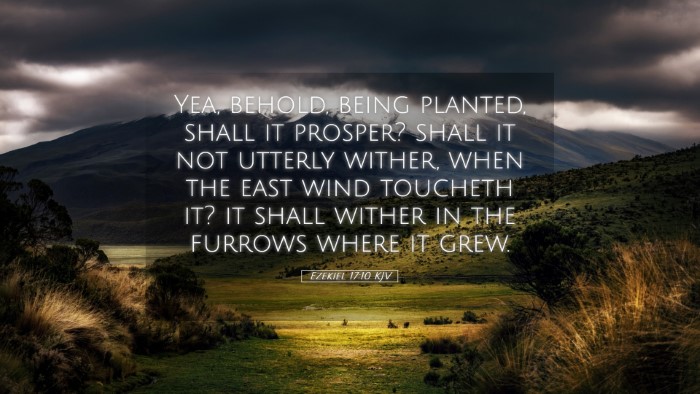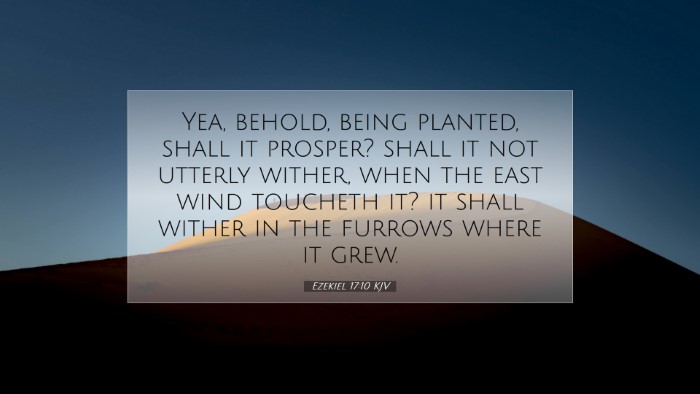Bible Commentary on Ezekiel 17:10
Ezekiel 17:10 (KJV): "Yea, behold, being planted, shall it prosper? shall it not utterly wither, when the east wind toucheth it? It shall wither in the furrows where it grew."
Introduction
The verse in Ezekiel 17:10 is part of a larger parable presented by the prophet Ezekiel, through which God communicates profound truths about the fate of Israel. The imagery of trees, planting, and winds serves a dual purpose: illustrating the promise of growth and the threat of destruction. This commentary seeks to delve into the theological significance, historical context, and application of this verse through insights from notable public domain biblical commentaries.
Historical Context
Ezekiel was a prophet during the Babylonian exile, a time filled with despair for the Israelites. The metaphor of a tree is significant; trees symbolize strength, life, and hope but also the inevitability of being subject to external forces. In Ezekiel 17, the imagery represents Jerusalem and its rulers' fate, drawing a comparison between the promised restoration and the consequences of disobedience.
Commentary Insights
Matthew Henry's Commentary
Matthew Henry emphasizes the contrast between the initial promise and the eventual judgment. He notes that a tree which has been transplanted carries the potential for growth, yet if it is exposed to harsh conditions—represented by the "east wind"—it is bound to wither. This notion aligns with the concept of divine sovereignty, where God oversees the growth and decay of nations. Henry elaborates that despite the appearance of flourishing, true prosperity depends on spiritual health and adherence to God's will.
Albert Barnes' Notes
Albert Barnes observes the practical implications of the east wind, often viewed as a destructive force in biblical literature. He explains that this wind symbolizes the threatening influences that come upon withering people—cultural, political, or spiritual adversities. In the case of Israel, the "east wind" refers to Babylonian oppression, indicating that external pressures can lead to spiritual and moral decay. Barnes urges readers to reflect on their resilience against life's adversities and warns against complacency during seemingly prosperous times.
Adam Clarke's Commentary
Adam Clarke takes a deeper look at the agricultural metaphor used in this verse, discussing the nature of planting and growth. The "furrows where it grew" signify the roots of Israel's identity, yet they become a source of vulnerability when external challenges arise. Clarke correlates this to the spiritual state of a nation: without nurturing relationships with God, even the strongest roots can fail under pressure. He encourages believers to remain rooted in divine truth to withstand life's trials.
Theological Reflections
The theological implications of Ezekiel 17:10 are significant. The core message speaks of the conditional nature of prosperity contingent upon divine favor. The image of withering underscores the fragility of human endeavors when divorced from God’s purpose. It warns against the false confidence found in appearances of strength that lack spiritual depth. This reflects the broader biblical narrative, where God's people continually need to realign themselves with His will to thrive.
Application for Believers
For pastors, students, and theologians, Ezekiel 17:10 offers several applications:
- Spiritual Resilience: Just as a tree may be planted, believers need to cultivate inner strength through prayer, study, and community.
- Awareness of Trials: Recognizing the challenges (the "east winds") we face can prompt deeper reliance on God rather than self-sufficiency.
- Community Reflection: Churches and congregations should take time to evaluate their spiritual health, questioning whether they are thriving amidst cultural pressures.
- Hope in Restoration: While the verse speaks of withering, it also hints at the idea of new growth and restoration. Believers are encouraged to maintain hope and engage in proactive spiritual renewal.
Conclusion
Ezekiel 17:10 serves as a poignant reminder of the necessity of grounding oneself in God’s truth amidst the vicissitudes of life. The commentators’ insights collectively emphasize that prosperity is not merely about external conditions but about the internal state of faithfulness and relationship with God. As believers reflect on this verse, they are called to assess the health of their roots and nurture them faithfully, knowing that true prosperity lies in alignment with God's will.


